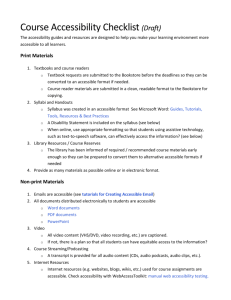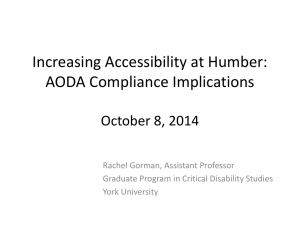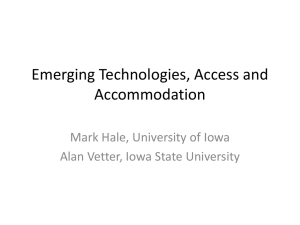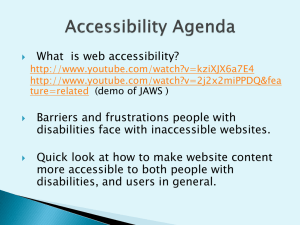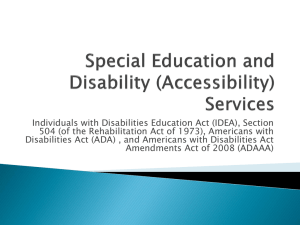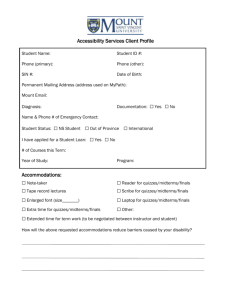Student Accessibility Handbook - West Virginia Northern Community
advertisement
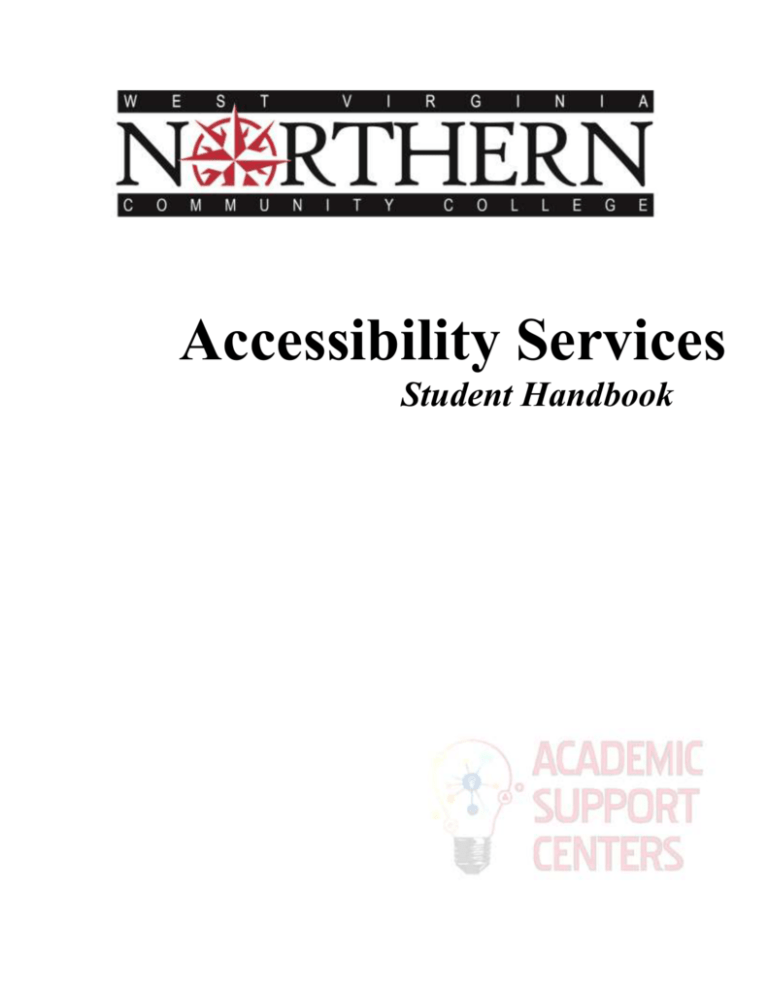
Accessibility Services Student Handbook 1 Table of Contents Notes and Disclaimers ................................................................................................................................ 4 Accessibility Support Services Contact Information ................................................................................... 5 ASC Hours of Operation .............................................................................................................................. 5 Accessibility Services Staff .......................................................................................................................... 5 Mission ........................................................................................................................................................ 6 Anti-Harassment/Anti-Discrimination Statement ...................................................................................... 6 Confidentiality and Release of Information ................................................................................................ 7 What Defines a Disabled Student? ............................................................................................................. 8 Initiating Services & Accommodations ....................................................................................................... 8 How to Apply for Classroom Accommodations .......................................................................................... 9 STEP ONE............................................................................................................................................. 9 STEP TWO............................................................................................................................................ 9 STEP THREE ......................................................................................................................................... 9 College Procedures ................................................................................................................................... 10 Receiving Accommodation Notification ............................................................................................... 10 Documentation Standards .................................................................................................................... 10 Temporary Accommodations and Services .......................................................................................... 11 Service Animals ......................................................................................................................................... 11 Reasonable Academic Accommodations & Procedures ........................................................................... 12 Other Services & Resources ...................................................................................................................... 13 Note Taking Assistance ......................................................................................................................... 13 Tape Recording Lectures....................................................................................................................... 13 Interpreting Policies and Procedures.................................................................................................... 13 Procedures for Testing Accommodations................................................................................................. 14 Pop Quizzes ............................................................................................................................................... 16 Policies Regarding Academic Misconduct during Testing..................................................................... 16 Assistive Technology ................................................................................................................................. 16 Transportation and Parking ...................................................................................................................... 17 Handicapped Parking Permits ............................................................................................................... 17 Emergency Procedures for Students with Disabilities .............................................................................. 18 West Virginia Northern Community College Emergency Response Plan ............................................. 18 2 Student Accessibility Accommodation Requests Appeal and/or Complaint Procedures ......................... 24 First Level Appeal/Complaint ................................................................................................................ 24 Second Level Appeal/Complaint ........................................................................................................... 24 Third Level Appeal/Complaint .............................................................................................................. 25 Disclaimer Regarding Complaints ......................................................................................................... 25 Campus & Other Resources ...................................................................................................................... 25 Miscellaneous Procedures for Students ................................................................................................... 27 3 Notes and Disclaimers Note: The Office of Accessibility (OA) is part of the Academic Support Center (ASC). This handbook is not all inclusive and is subject to change without notice. The handbook is not intended to replace academic requirements for courses or programs, nor is the handbook meant to represent or replace student code of conduct policies. For additional information, please refer to the Student Catalog, WVNCC website, and the Student Handbook. To the best knowledge of West Virginia Northern Community College staff, information contained in this publication was correct at the time it was distributed. However, this publication should not be considered in any way to constitute a contract between West Virginia Northern and any student. West Virginia Northern reserves the right to make changes in tuition, fees, admissions, regulations, schedules, or curricula without prior notice or obligation. 4 Accessibility Support Services Contact Information Kevin Serig, Accessibility Counselor 1704 Market Street Wheeling, West Virginia 26003 304-214-8938 kserig@wvncc.edu ASC Hours of Operation Fall and Spring Monday-Thursday 8:00 am – 5:00 pm Friday 8:00 am – 4:30 pm Summer Monday-Thursday 7:00 am – 5:00 pm Friday – closed Accessibility Services Staff CJ Farnsworth-Director of Academic Student Support Services cfarnsworth@wvncc.edu Kevin Serig, Accessibility Counselor II kserig@wvncc.edu Other staff who assist with academic accommodation include the following: Lawrence De Rosa, Academic Program Associate (Tutoring Center), Weirton Campus lderosa@wvncc.edu Dennis Bills, Academic Program Associate (Tutoring Center), New Martinsville Campus dbills@wvncc.edu 5 Mission West Virginia Northern Community College’s mission is to provide higher education empowering individuals to achieve academic and career goals leading to a competent workforce which excels in a global economy. The College responds to the educational, cultural and civic needs of the communities it serves by offering an accessible, safe, diverse, and high-quality learning environment. Anti-Harassment/Anti-Discrimination Statement West Virginia Northern Community College, pursuant to the requirements of Titles IV, VI, VII of the Civil Rights Act of 1964, Title IX of the Educational Amendments of 1972, Section 504 of the Rehabilitation Act of 1973, and the Age Discrimination Act of 1975, does not discriminate against applicants, employees, or students on the basis of race, color, religion, sexual orientation, disability, age, gender, ancestry, marital or parental status or national origin in its employment policies and/or educational programs or activities, including admissions to such. Inquiries concerning this rule should be directed to Chief Human Resource Officer Peggy Carmichael, who is designated coordinator for Title IX and Section 504. Her telephone number is 304-214-8901 and her office is located in Room 125-B, B&O Building, Wheeling campus. Her email address is pcarmichael@wvncc.edu. 6 Confidentiality and Release of Information The ASC views all materials pertaining to a student’s disability as confidential. This policy is based upon government mandates regarding the confidential treatment of disability-related information. Any written material regarding the student’s disability obtained by the Accessibility Counselor is used to verify the disability and plan for reasonable accommodations. All disability-related information for students at West Virginia Northern Community College is housed in the ASC Accessibility Office. Each student has a separate file housed in a secure location. Only staff persons working in the ASC have access to these files. Disability information may be released only when a student submits a signed “Release of Confidentiality” to the Accessibility Counselor. The Family Educational Rights and Privacy Act of 1974 as amended (FERPA), also known as the Buckley Amendment, and the Americans with Disabilities Act Amendments Act (ADAAA) do not allow faculty or others access to disability-related information unless student has signed a release form. FERPA also permits disclosures of information in a health or safety emergency, if in light of the circumstances and information available at the time, that knowledge of the information is necessary to protect the health or safety of a student or other individuals. According to the Association on Higher Education and Disabilities (AHEAD), “Disability related records provided by a physician, psychiatrist, psychologist, or other recognized professional are not subject to free access under FERPA.” A student may request to review the contents of his/her own file when an ASC staff member is present. All information in the file is the property of the ASC Accessibility Office. The ASC Accessibility Office will retain hard copies of all disability documentation during enrollment and after students have not enrolled at the college for five (5) consecutive years. 7 What Defines a Disabled Student? A person with a disability, defined by the “ADA Amendments Act of 2008,” includes “Any person who (1) has a physical or mental impairment which substantially limits one or more major life activities, (2) has record of such impairment, or (3) is regarded as having such impairment.” A qualified person with a disability is defined as one “Who meets the requisite academic and technical standards required for admission or participation in the post-secondary education institution’s programs or activities.” Initiating Services & Accommodations Students must schedule an Intake Interview with the Accessibility Counselor prior to receiving accommodation. Students should bring any relevant documentation with them for the Intake Interview appointment. Students should expect to see the Accessibility Counselor at the beginning of each semester to pick-up a current letter of accommodation. *Important Note: Students should immediately alert the Accessibility Counselor and/or instructor if he/she is having difficulties with any accommodation, service, or class. 8 How to Request Academic Accommodations STEP ONE Make an appointment for an Intake Interview with the Accessibility Office Counselor Students with disabilities must request services and accommodations for all academic and nonacademic programs, services and events. STEP TWO Provide Documentation/Verification of Disability A student with a physical, sensory, psychiatric, or health-related disability needs to provide documentation by a qualified professional verifying a disabling condition. The student should present the verified documentation to the Accessibility Counselor during the Intake Interview. STEP THREE Arrange Accommodations After the Intake Interview and verification of the disability, the Accessibility Counselor will make arrangements for letters detailing the specific accommodations the student is able to receive. The specific disability/diagnosis will not be disclosed unless it is determined necessary for the student’s health, wellbeing or success; information on disabilities pertaining to a particular student will be given to instructors on a need to know basis. Once accommodations have been put in place, students should introduce themselves to the instructor during the first week of classes and seek the instructor’s feedback about how the accommodations can be best implemented in that particular course. How to Request Non-Academic Accommodation There is more to being a WVNCC student than going to class and the Academic Support Center Office of Accessibility wants to assure equal opportunity for students who choose to attend campus events and participate in the campus community. The Accessibility Counselor works with students and appropriate campus staff/departments to ensure that students with disabilities have access to all non-academic student programs and activities. Non-academic accommodations may be requested related to programs, services, jobs, activities, or facilities in order to ensure equitable opportunity to engage in the campus environment and with the campus community. Accommodation requests for participation in any non-academic, school related activity, program or service should be made through the Accessibility Office in the same manner that academic accommodation requests are made. Students are responsible for making requests that require time to plan for or implement in advance. 9 In addition, WVNCC follows all ADA guidelines and regulations regarding accessible parking, restrooms and classrooms. WVNCC is not a residential campus, but if an architectural barrier is identified in any building or classroom, staff and administration will consider the feasibility of requests for change or will develop an accommodation to meet the need. College Procedures Receiving Accommodation Notification At the start of each semester or as soon as a student has completed the Intake Interview and provided adequate documentation, faculty members will receive an electronic “Student Accommodation Letter” via their WVNCC email address. This letter will explain what accommodations are needed for each student based on his or her documented disability. The student is also required to see the Accessibility Counselor at the beginning of each semester to confirm enrollment with Accessibility Services and pick-up a copy of the letter of accommodation. If a student indicates to a member of the WVNCC faculty or staff that he/she has a disability and desires accommodation, that faculty/staff member should advise the student to contact Kevin Serig, Accessibility Counselor, to schedule an Intake Interview. This will ensure that the appropriate documentation is in place and also that the student is counseled regarding WVNCC accessibility procedures and policies. Documentation Standards The ASC encourages students to meet with the Counselor in Accessibility Services as soon as possible during the admission process to schedule an Intake Interview. Our priority is to get to know each student individually. Any documentation students can readily share during the Intake Interview, such as IEP/504 Plans, recent evaluations, letters from doctors or psychologists, hospital reports, etc., is helpful. We will use information obtained through previous documentation and individual interview to assist each student with the coordination of reasonable accommodation. Providing as much information as possible during the Intake Interview can save the need for repeat trips to the ASC. The purpose of third party documentation is to add to the Counselor's understanding of each student’s need for accommodation so that a reasonable outcome, including acceptance or denial of a request, can be identified. Third party documentation supports or builds on the conversation with the student regarding reasonable accommodation. Third party documentation can be particularly useful when a student presents with a hidden disability. Ultimately, documentation is seen as a bridge between what the student reports and the Counselor's professional assessment. When there is a gap in understanding, third-party documentation is very often needed to determine reasonable accommodations. 10 Please note that reasonable accommodations do not and should not: substantially alter the educational standards or mission of WV Northern fundamentally alter the nature of the program, course, service, activity, and/or practice/policy as written and applied allow access to a program when a student is not otherwise qualified (with or without accommodations) to meet the academic and technical standards required for admission or participation in an education program, course, service and/or activity cause undue financial or administrative hardship (college-wide) be of a personal service in nature (personal aid, study coach, individually paid tutor, etc.) pose a direct threat to the health or safety of the student with a disability or others as a result of accommodation implementation. The counselor's role is always to work with the student to determine what accommodations, if any, would be reasonable in each situation. It should be noted that documentation policies differ from one institution to another. If a student will attend another institution or take a standardized test (GRE, MCAT, etc.) administered by an outside agency, the student is responsible for researching those documentation policies and should investigate requirements at least six months prior to an anticipated start date or test date. Temporary Accommodations and Services The ASC Office of Accessibility offers a wide variety of legally mandated services to students with temporary documented disabilities. Services are extended to students with temporary disabilities only for the duration of their functional limitations associated with the disability. The eligibility process is the same as for permanent disability cases. After reviewing the documentation, staff will recommend appropriate academic services and accommodations depending on the student’s limitations in the academic setting. *Important Note: Services and accommodations are authorized based on the student’s specific disability and functional limitations. The student may or may not receive all of the accommodations contained in this handbook. Service Animals 11 According to the Americans with Disabilities Act Amendments Act (ADAAA), a service animal is defined as "any animal individually trained to work or perform tasks for the benefit of an individual with a disability, including, but not limited to, guiding individuals with impaired vision, alerting individuals to an impending seizure or protecting individuals during one, and alerting individuals who are hearing impaired to intruders, or pulling a wheelchair and fetching dropped items." Service animals may accompany a person with a disability everywhere on campus. If there are any questions as to whether an animal qualifies as a service animal, a determination will be made by the Accessibility Counselor. In compliance with the ADAAA, service animals are welcome in all buildings on campus and may attend any class, meeting, or other event. Disabled students desiring to use a service animal on campus must contact the Accessibility Office to register as a student with a disability, at which point the staff will evaluate the documented disability and recommend any additional accommodations appropriate to the functional limitations of the disability. Requirements of service animals and their owners include: Dogs must be licensed in accordance with county regulations and wear a vaccination tag. Animals must be in good health. Animals must be on a leash. The owner must be in full control of the animal at all times. The owner must provide the ASC Office of Accessibility information as to how the animal accommodates for his or her disability. Cleanliness of the service animal is mandatory. Consideration of others must be taken into account when providing maintenance and hygiene of service animals. The owner is expected to clean and dispose of all animal waste. Reasonable Academic Accommodations & Procedures Listed below are some accommodations offered by the ASC Accessibility Office: Extended Test Time Alternative Testing Area Brailled Materials Oral or Large Print Exams Test Proctor Electronic Text Books Preferential Seating Assistive Technology Software 12 Other Services & Resources Note Taking Assistance Students authorized for note taking assistance will work with the Accessibilities Counselor and each instructor to determine the best method of assistance with notes. Tape Recording Lectures The student should inform the instructor that he/she will be recording lecture and place device and/or position themselves at the front of the classroom, close to the instructor. Interpreting Policies and Procedures All interpreters are interviewed by ASC Accessibility staff and are selected based on an assessment of interpreter skills, experience in a post-secondary setting, and the ability to handle discourse at this level. While the ASC employs certified and non-certified interpreters, certification is encouraged. Family members cannot be hired to serve as interpreters. Students who wish to have interpreter services must: Meet with the Accessibility Counselor and an interpreter before classroom services can be initiated. This ensures that he/she will receive services through the ASC. Provide the Accessibility Counselor with a copy of class schedule as soon as he/she registers. Report any changes in daily or weekly class schedule to the Accessibility Counselor as soon as possible. Inform the Accessibility Counselor when interpreting services will no longer be needed. If a student who is utilizing the services of an interpreter doesn’t show up for a meeting, class, or other appointment without notifying the Accessibility Counselor or the interpreter first, the interpreter will be asked to wait fifteen minutes before leaving. *Important Note: The ASC does not provide personal care attendants. This is the responsibility of the student. 13 Procedures for Testing Accommodations Common Test Accommodations: Extended testing time - The amount of extended time is correlated to the test-taker’s disability or limitations Time and one half (50% more time than regular testing time) Double time (100% more time than regular testing time) Unlimited time Distraction-free/Individual testing room – Provided to those whose disability necessitates separation from all other examinees Breaks - Determined case-by-case depending upon student’s disability/limitations and the specifics of the test requirements Reader - A reader is a person who reads the test to the test-taker. A reader does not interpret, re-word, or explain the test. A reader reads the test directions, questions, and answer choices exactly as written. When a reader is required, a separate room is also necessary. Alternative format - Alternative format is any format that is different from the existing test. Alternative formats include: large print, Braille, color-coded text, audio (reader, tape/cd, or computer). Scribe - A scribe is a person who writes down, or otherwise records, the test-taker’s responses. The scribe does not create answers for the test-taker or help the test-taker identify correct answers. The scribe simply writes the test-taker’s answers exactly as given. *Individuals registered with the office of Accessibility Services are dealt with on a case-by-case basis. There may be cases that require additional/alternative testing accommodations. In these situations, the Office of Accessibility will with work closely with student and instructor to make arrangements for appropriate and reasonable accommodation. Procedure for Making Test Accommodations: The student should discuss testing accommodation with his/her instructor prior to each test to determine the instructor’s preference regarding implementation of accommodation. 1. Faculty discretion- Faculty may choose to make arrangements for meeting test accommodations themselves. As long as the accommodations are made as specified, faculty may make arrangements independently. Any questions regarding appropriate implementation of accommodations can be directed to Student Accessibility Counselor, Kevin Serig, ext. 8938. 14 2. For testing with Accessibility Services: The student in need of testing accommodation should make a request via email at least 24 hours (1 work day) in advance. (Faculty may elect to handle the request and should copy the student on the request). The request should be sent to Accessibility Counselor kserig@wvncc.edu. The instructor should be Cc’ed on this email request. The email request should include the date, time and course for which the student wishes to schedule his/her test. EXAMPLE: To: Kevin Serig Cc: Helen Smith Subject: Schedule Testing After speaking with Professor Smith, I would like to schedule my PSYCH 101 test on Monday, November 15 at 2:00 pm in an ASC test room. Thank you, Joe Student A member of the ASC team will then contact the instructor to make arrangements for receiving the test materials and any instructions prior to that time. Instructors may: Email/scan a test directly to the Accessibility Counselor Bring a hard copy of the test to the Academic Support Center Make arrangements for the ASC staff to pick up the materials Put the test/instructions in a sealed envelope and leave in the ASC campus mailbox A member of the ASC team will then return the completed test to the instructor per his/her preferred method within 24 hours. IMPORTANT: 1. All test takers will be required to leave their belongings (backpacks, purses, electronics etc.) outside of the testing room/area. 2. All test takers will be observed throughout testing, either by a proctor (in person) or direct video surveillance monitored by Accessibility Counselor Kevin Serig. 3. The Academic Support Center respects the integrity of all WVNCC academic programs. Accessibility Services will work closely with faculty to ensure that accommodations are made appropriately, reasonably and impartially. 15 4. We appreciate your cooperation in adhering to these procedures as they allow us to protect the reliability of test results and the veracity of instructional programs. 5. Students are expected to be on time for scheduled test sessions. o Cancellations should be made in advance when possible. o A student arriving late may not have his/her exam time extended. The end time of the exam may not change due to the late arrival, as space and/or proctor availability may be limited. o Students may not be allowed to take an exam if arriving 30 minutes (or more) late. A new request will need to be made. The student is responsible for any consequences per the instructor/course guidelines. o Students failing to arrive for a scheduled test session will be considered a “no show” - a new request must be made. Pop Quizzes The instructor must provide the same accommodations to the student in the event of a pop quiz as required for regular exams. Policies Regarding Academic Misconduct during Testing Students are not permitted to lock any doors in the testing rooms. Any unauthorized notes and/or any scrap paper used during the exam, or discovered before, during, or after the exam will be confiscated and returned with the exam to the instructor and testing will be stopped immediately. A staff member may come into the room at any time to perform a random integrity check. Any suspected evidence of cheating will be documented and reported to the instructor. Assistive Technology Tri-Campus Resources are provided through the ASC Accessibility Office on the Wheeling Campus. Available Assistive Technology includes: Braille Machine: This machine produces text in a Braille format for blind students. Students can e-mail their documents to be reproduced in Braille to SSSD staff. If they are only available in hard copy form the student may send them to Room 221 or 225C, B & O Building (Wheeling Campus). 16 Kurzweil: Software. This software verbally reads computer screens to the visually impaired/blind or students with learning disabilities. Magic: Software that enlarges computer screens. Jaws: Software that reads to students with visual impairments. Dragon: Software that types as words are dictated. Magnifiers: portable One handed keyboards CTV’s-Closed Circuit Television-Magnification Wireless keyboards Pac Mate: portable Braille note taker Intel Reader-portable and stationary scanner/reader Ubi-Duo-portable communicator-unit to unit type communication Video Phone System-sign language telephone system N-touch-computer video phone system-signed language telephone communication on screen software Zoom Text software-magnifier Talking Calculators-speaking calculator for visually impaired students Ergonomic Desks *Important Note: If a student wants to request a type of equipment not listed above, or if a student finds that equipment or resources are not working properly, they should contact the Accessibility Office. Transportation and Parking Handicapped Parking Permits Handicapped parking spaces are designated in the various parking areas. These spaces are to be utilized by persons who possess valid documentation of a disability. Students need to also obtain a WVNCC parking permit and place the permit visibly (on the dashboard or hanging from the rearview mirror) in their vehicles. Parking permits for college parking are free and must be renewed by returning students once the parking permit expires. 17 *Important Note (according to the West Virginia Code): It is illegal to use someone else’s Handicap parking permit. If a student does not have the required parking permit, he or she will be issued a citation. Violators will be issued a parking citation ($100.00 civil penalty), and/or their vehicle will be towed or an immobilization device will be installed upon the vehicle. Emergency Procedures for Students with Disabilities For a student with a disability, it is important to take responsibility for his or her own safety. In order to ensure this, students should develop an emergency plan or strategy in advance. How a student responds to an emergency depends on: the type of emergency the student’s specific disability the location of the student If a student has physical limitations which may prevent him or her from taking stairs in case of a fire, West Virginia State emergency procedure policy instructs that the student wait in the stairwell of the building he or she is in, to make sure the stairwell door is closed, and an officer or emergency personnel will be there shortly to assist. Any additional questions regarding this should be directed to the Accessibility Counselor. *Important Note: For any emergency and for students with any type of disability, the first step is to contact 911. When reporting the emergency, it is important for the student to indicate his or her specific evacuation needs (e.g., wheelchair, respirator, have breathing or stamina difficulties). West Virginia Northern Community College Emergency Response Plan Programs for Persons with Disabilities (ADAAA) This section describes programs and methods of communication and assistance utilized at the college to ensure the safety and well-being of Persons with Disabilities (ADA) during an actual incident requiring implementation of the Emergency Response Plan. Alert Response and Major Event Notification WVNCC, in keeping with its long-standing tradition of being accessible and responsive to the needs of persons with disabilities (ADA), has implemented the procedures below, which describe alerting systems designed to ensure that ADA personnel are notified and immediately become aware that the Emergency Response Plan has been implemented. Additionally, the 18 system is designed to ensure that wheelchair bound ADA persons are properly and safely transported. Audible Systems Emergency Siren Activation: In the event that a natural or man-made incident occurs that may possibly impact the health and safety of personnel at WVNCC and/or the surrounding community, local emergency services will initiate notification to the public. Text Alert System How to Sign up for WVNCC Watch Text Alert System: The College has contracted with a text messaging service, Timecruiser, to use its Cruiser Alert system to allow WVNCC faculty, staff, and students to sign up to receive text message alerts that the College will send under emergency notification. Emergency notification could mean a weather alert which affects large numbers of the WVNCC college community, campus emergency, or other urgent need to get information out. It is important that your mobile contact information is kept current. Below are instructions for activating the Text Alert System on your mobile phone: 1. Log in to your My WVNCC Student Portal and click “WVNCC Watch (Cruiser Alert).” 2. Use the beginning of your WVNCC email address (before the @ sign) as your login (it is case sensitive so use all lower case letters) and your N number (Northern ID number with a capital N) as your password. You will need to “ACCEPT” the terms of their standard usage agreement. 3. You will be prompted to change your password and put in a password hint (in case you forget your password.) 4. You will then go to the My Cruiser tab and CLICK ADD PHONE NUMBER and add your cell phone number and choose your cell phone carrier from the list- Make sure to have your cell phone close by to receive your activation code (code is case sensitive) You are automatically signed up for emergency alerts. 5. When you receive your confirmation text get the 4 digit code in the text and put the CODE in the box on your screen. Click activate 6. You are finished. Remember if you change cell phone numbers to update the number here. The text messaging system is for MOBILE/CELL PHONES ONLY(not prepaid phones) and not home phone. Incidents or Situations This section addresses the needs and requirements of Persons with Disabilities (ADA) and established procedures to be followed in the event that an incident or situation occurs requiring 19 the implementation of the Emergency Response Plan. These procedures cover the appropriate response to be taken by ADA persons during an actual emergency or during a Practice Exercise of the plan. Persons with disabilities on becoming aware of the implementation of the Emergency Response Plan will follow the below outlined procedures: On Campus Grounds: Report to the Assembly Area in the building closest to the student’s location. Assembly Area At Entry Level: If Assembly Area is located on the same level as the building entry point; Report to Assembly Area. If on the Wheeling, Weirton, or New Martinsville campus, ensure that the Emergency Response Team is aware of the student’s presence and any special needs or assistance required. Assembly Area Other Than Entry Level: Report to entry level stairway and STANDBY for assistance. Inside Building-Not in Class: Assembly Area In Building: Report to Assembly Area if feasible. Request assistance from available personnel. Report to elevator area or to nearest staircase (if no elevator present) and STANDBY for assistance. In Classroom: Report to Assembly Area, along with fellow classmates, if feasible, or Report to nearest elevator area/staircase (if elevator not available) and STANDBY for Assistance. At Assembly Area: Accessibility Counselor on arriving at the Assembly Area will: Ensure that the Emergency Team and appropriate school administrator is aware of the student’s presence and of any special needs or requirements. 20 Remain calm, listen and follow instructions. Prepare to Evacuate: Should the College announce to prepare for evacuation, Accessibility Counselor will: Make the Emergency Personnel and appropriate school administrator aware of special needs for assistance. Gather personal property. Remain calm. When the Emergency Personnel or appropriate school administrator announces that the order to effect the Evacuation Process has been received, Accessibility Counselor will: Listen closely to information being relayed by the Emergency Text Message, school administrator, or Emergency Personnel pertaining to: 1. Sequence in which the student’s particular assembly area will evacuate. 2. Wind direction. 3. Route to be followed in the Evacuation Process. 4. Location of off campus Gathering Point. Advise faculty/staff/administration member of special needs, particularly the desired method to be utilized in transporting if a student is in a wheelchair. Students with Mobility Impairments When an elevator becomes inoperable, students with mobility impairments should alert someone (faculty or staff) to the situation. Elevators provide access for students with mobility impairments to classrooms throughout campus. However, during an emergency such as a fire or tornado, elevators can be very dangerous and often cease working. Furthermore, elevators have been known to break down at times, leaving people with mobility impairments stranded on upper floors. As a result, it is unlikely that some students will be able to evacuate without the assistance of others. The evacuation of a person who uses a wheelchair is best left to emergency personnel with extensive training in evacuation procedures and the proper equipment. Asking untrained individuals to assist in evacuation could lead to injury to the student or the person assisting the student. 21 Students with Visual Impairments Students with a visual impairment should develop a Plan of Action for emergency situations as well. An ideal time to develop this plan is at the start of each semester as he/she works with a mobility and orientation specialist to locate classrooms. Identify the emergency exit(s) that is closest to the student. The individual student should determine if he/she will need assistance in the event of emergency. If assistance is required, the student should discuss specific needs with the instructor and the Accessibility Counselor. Students with Seizure Disorders If a student has a seizure disorder, a Plan of Action should be made with the Accessibility Counselor who will alert the student’s instructor to his/her condition and how to respond. The faculty member should be informed regarding what to expect if the student has a seizure during class and under what circumstances it would be necessary to call for an ambulance. Please follow the below instructions regarding seizures. Each student will have a Plan of Action sheet that is to be completed at the beginning of each semester and is then placed in the appropriate areas on campus. First Aid for Generalized Tonic Clonic (Grand Mal) Seizures In a generalized tonic clonic seizure the whole brain is affected from the beginning. There is a cry and loss of consciousness, arms flex up then extend in and remain rigid (the tonic phase) for a few seconds. A series of jerking movements take place (the clonic phase) as muscles contract and relax together. The jerking will slow down and will eventually stop. The person is placed on his/her side to aid breathing and to keep the airway clear. During a generalized tonic-clonic seizure the person suddenly falls to the ground and has a convulsive seizure. It is essential to protect him or her from injury. Cradle the head or place something soft under it, a towel or a hand, for example. Remove all dangerous objects. A bystander can do nothing to prevent or terminate an attack. At the end of the seizure, make sure the mouth is cleared of food and saliva by turning the person on his or her side to provide an open airway and allow fluids to drain. If the person assisting remains calm, the person having the seizure will be reassured when he or she regains consciousness. Breathing almost always resumes spontaneously after a convulsive seizure. Failure to resume breathing signals a complication of the seizure such as a blocked airway, heart attack, or severe head or neck injury. In these unusual circumstances, CPR must start immediately. If repeated seizures occur, or if a single seizure lasts longer than five minutes, the person should be taken to a medical facility immediately. Prolonged or repeated seizures may suggest status epilepticus (nonstop seizures), which requires emergency medical treatment. 22 When providing seizure first aid for generalized tonic clonic (grand mal) seizures, these are the key things to remember: Keep calm and reassure other people who may be nearby. Don't hold the person down or try to stop his movements. Time the seizure with a watch. Clear the area around the person of anything hard or sharp. Loosen ties or anything around the neck that may make breathing difficult. Put something flat and soft, like a folded jacket, under the head. Turn him or her gently onto one side. This will help keep the airway clear. Do not try to force the mouth open with any hard implement or with fingers. It is not true that a person having a seizure can swallow his tongue. Efforts to hold the tongue down can injure teeth or jaw. Don't attempt artificial respiration, except in the unlikely event that a person does not start breathing again after the seizure has stopped. Stay with the person until the seizure ends naturally. Be friendly and reassuring as consciousness returns. Offer to call a taxi, friend, or relative to help the person get home if he seems confused or unable to get home by himself. First Aid for Non-Convulsive Seizures Intervention may not be required if a person has brief periods of staring or shaking of the limbs. If someone has the kind of seizure that produces a dazed state and automatic behavior, the best thing to do is: Watch the person carefully and explain to others what is happening. Often people who don't recognize this kind of behavior as a seizure think that the dazed person is drunk or on drugs. Speak quietly and calmly in a friendly way. Guide the person gently away from any danger, such as a steep flight of steps, a busy highway, or a hot stove. Don't grab the person, however, unless some immediate danger threatens. People having this kind of seizure are on "automatic pilot" so far as their 23 movements are concerned. Instinct may make them struggle or lash out at the person who is trying to hold them. Stay with the person until full consciousness returns, and offer help in returning home. *Important Note: Information provided from the Epilepsy Foundation www.epilepsyfoundation.org Student Accessibility Accommodation Requests Appeal and/or Complaint Procedures This appeal process shall apply to situations where a student, based on a disability related issue, has requested an accommodation which has been denied or is experiencing problems or concerns with an approved accommodation. Students are requested to begin with a First Level Appeal and have the option to continue the appeal process through Level Three. Students experiencing problems/complaints with an approved accommodation are referred to the ASC Accessibility Office for assistance. If the problem/complaint involves the Accessibility Office, or is not resolved to the student’s satisfaction at that level, then the student may request an Accommodations Appeal/Complaint Form and begin with Level Two and proceed through the remainder of the process. First Level Appeal/Complaint The student should complete an Accommodations Appeal/Complaint Form and submit it to the ASC Accessibility Office within ten days of the concern/issue. The ASC may render a decision, request additional information, or schedule a mediation conference. Upon receiving the additional information or completion of the mediation, a decision must be rendered in writing within ten days, exclusive of weekend, holiday, vacation, etc. The final decision of the ASC can be appealed to the second level. Second Level Appeal/Complaint The decision at the First Level may be appealed within ten days of the first level final decision by notifying in writing, the ADA Coordinator of West Virginia Northern Community College. The ADA Coordinator may request additional information, but must rule in writing within ten days upon receiving the additional information, exclusive of weekend, holiday, vacation, etc. The final decision of the ADA Coordinator can be appealed to the third level. 24 Third Level Appeal/Complaint The decision at the Second Level may be appealed within ten days of Level Two final decisions by notifying the President or his designee. The President or his designee may request additional information, but must rule in writing within ten days upon receiving the additional information, exclusive of weekend, holiday, vacation, etc. The President’s decision is final. Disclaimer Regarding Complaints Maximum confidentiality will be maintained, although the appellant may be asked for permission on a “need-to-know” basis to provide or allow disclosure of pertinent medical, academic, and other significant records as necessary in order to decide the appeal/complaint. Failure by the student to release information may result in a halting of the process at the last level of which the information was disclosed or cancellation of the appeal in its entirety due to lack of supporting documentation if the needed information was never disclosed. Nothing in the West Virginia Northern Community College Student Accessibility Accommodations Requests Appeal/Complaint Procedures should be construed to impede or prohibit a timely filing of an ADA or discrimination complaint with the appropriate external governmental agency. Campus & Other Resources Academic Support Center/Tutoring CJ Farnsworth, Director/Academic Student Support Services 304-214-8853 cfarnsworth@wvncc.edu Stephanie Smith, Academic Program Associate (Weirton) 304-214-8922 ssmith@wvncc.edu Lawrence De Rosa, Academic Program Associate (Weirton) 304-723-7514 lderosa@wvncc.edu Dennis Bills, Academic Program Associate (New Martinsville) 304-51-8773 dbills@wvncc.edu 25 Wheeling Academic Support Center (ASC), room 225 B&O Building, 1704 Market Street New Martinsville Academic Support Center (ASC), room 114, 141 Main Street Weirton Academic Support Center (ASC), room 107, 150 Park Avenue The Academic Support Centers provide support to ALL students attending WVNCC. Services available through the Center include: tutoring services, academic skills counseling, developmental counseling, advising and retention. Tutoring services are available on all three campuses. Tutoring is available free of charge to all WVNCC students by both faculty and peer tutors who are available to assist with mathematics, English, anatomy and physiology, computer skills, and various other subjects in our catalog. Department of Human Resources Peggy Carmichael, Chief Human Resources Officer ADA Coordinator (ADA/504/508) pcarmichael@wvncc.edu This office collaborates with College offices, government agencies and advocacy groups to ensure College compliance with state and federal mandates. Career Planning and Placement The Career Planning and Placement Office on the Wheeling campus and campus counselors in Weirton and New Martinsville provide assistance in exploring career options, making career decisions, and conducting effective job searches. Among the services available are: Individualized career counseling Interest and values assessment Workshops in career decision making, resume writing, and interview skills Regional job fairs Assistance with online job searches Credential (resume and references) service Job postings and employment referrals Tami Becker, Career Services Counselor tbecker@wvncc.edu 304-214-8946 Testing & Placement 26 The West Virginia Higher Education Policy Commission (HEPC) requires that all degreeseeking students complete placement testing to demonstrate ability to complete college-level courses. Students are not required to complete testing (1) if they have ACT/SAT scores OR (2) if they have completed prior college-level English and/or Math courses at an accredited institution. If neither applies, students are required to undergo placement testing at WVNCC to determine course placement. If accommodation is needed for placement testing, students should contact the Accessibility Counselor to make arrangements. West Virginia Division of Rehabilitation Services Central Union Building 40-14th Street Wheeling, WV 26003 Wheeling District and Branch Offices: (304) 238-1092 Weirton Branch Office: 304-723-5311 Parkersburg Branch Office: 304-420-4580 Sistersville Branch Office: 304-652-2354 The West Virginia Division of Rehabilitation Services helps people with disabilities prepare for, get, keep or advance in competitive employment. To accomplish that goal, they provide a broad range of vocational rehabilitation services, such as quality job training, rehabilitation therapy and other support services to people with disabilities across the state. Their goal is to enable and empower people to live independently. Miscellaneous Procedures for Students Please note any academic policies or procedures available electronically or on paper can be provided in an alternative format. Please contact the Accessibility Office if needed. . 27

